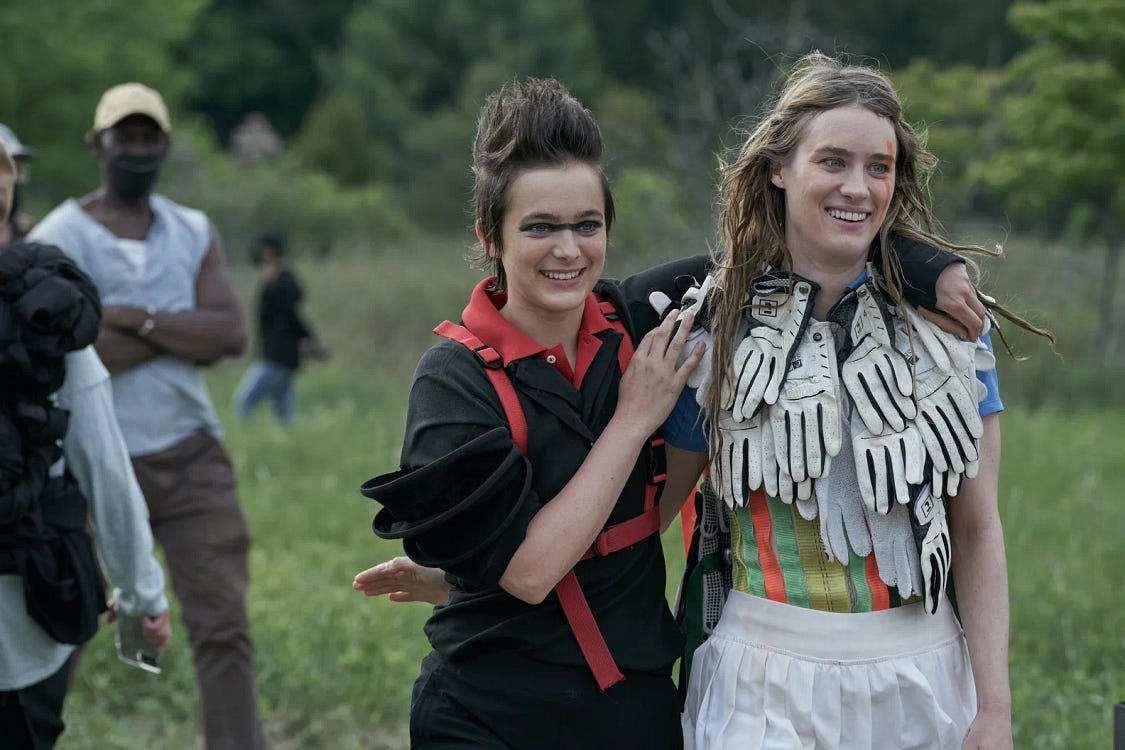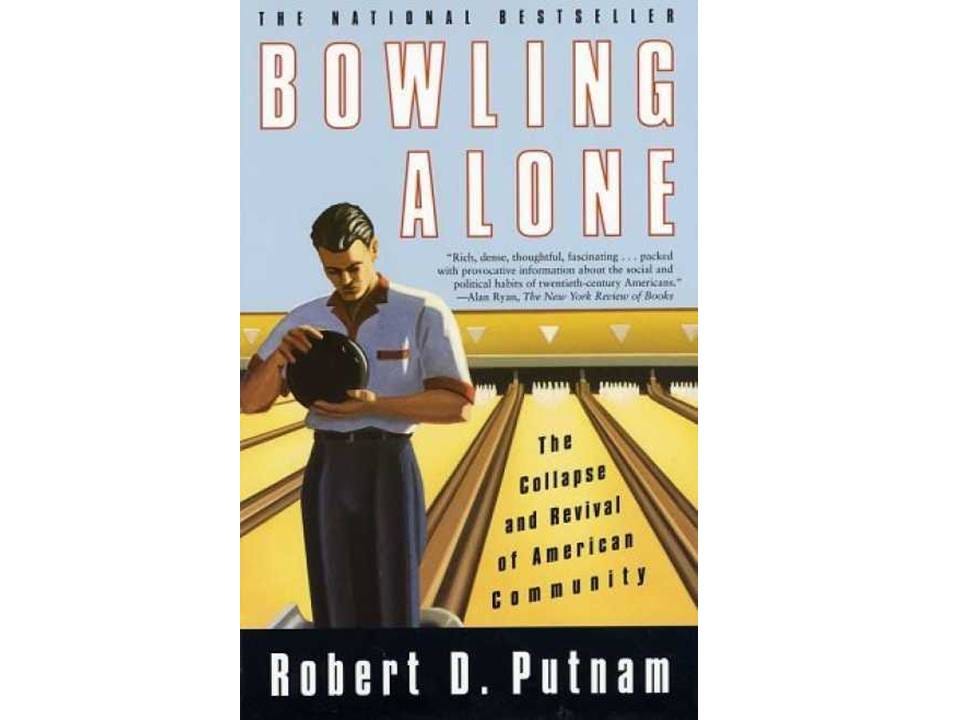One of the most reliable tropes of apocalypse movies is the lone, rugged hero (virtually always male, occasionally protecting assorted women and children): think Will Smith in I Am Legend, Pedro Pascal in The Last of Us, Cillian Murphy in 28 Days Later, Viggo Mortensen in The Road.
Only rarely do movies show proper communities after apocalypses. It’s one reason why Station Eleven, with its Travelling Symphony (above), was such a breath of fresh air.
It’s odd that apocalypse fiction has such a blind spot about this, because in real life, it’s relationships, communities and tend-and-befriend that get us through times of upheaval.
I’ve written before here about what we think happens after disasters (mass looting, everyone for themselves, martial law) versus what actually happens (people find meaning, purpose and agency amid the crisis; they look out for each other, often heroically; connection is a source of strength, not vulnerability).
Lots of us experienced this during the pandemic. Even amid the enforced isolation, we came together in so many ways to look after each other — in our families, in our relationships, through volunteering, mutual aid, and activism.
But overall, the bigger picture right now is one of chronic disconnection. We live in more solitary, individualised times than ever before. And that’s a big challenge as those times become steadily more turbulent.
Scrolling alone
I chuckled in rueful recognition when I read this by Jo Ellison last weekend:
Do you want to go out? Meet for a drink? Wouldn’t it be nice to catch up? No, not really, thank you very much.
All of these queries are things I approach with a sense of dread and caution. I love my friends: I adore them. But I hate schlepping across town, crowding into a space and then trying to make conversation. The whole business of socialising feels a bit too much like work.
Besides, few outings could compete with “doing the internet”, those golden moments when, untethered by obligation, domestic chore or husbandry, one can idle hours with only tiny taps.
Eating out with friends is so pre-pandemic. Nowadays, we’d rather do it on our own: according to reservations site Open Table, solo dining in the US has increased by 29% over the last two years, and in the UK by 14% in just the last year.
That’s if we make it out of the house at all. In the US in 2023, 74% of all restaurant traffic was from ‘off premises’ customers — takeout and delivery, in other words — up from 61% before Covid.
The Atlantic captured the zeitgeist in this sorry tale of how a local restaurant’s once thriving bar area had been converted into “a silent depot for customers to grab food to eat at home”:
Until the pandemic, the bar was bustling and popular with regulars. “It’s just a few seats, but it was a pretty happening place,” Rae Mosher, the restaurant’s general manager, told me. “I can’t tell you how sad I’ve been about it,” she went on. “I know it hinders communications between customers and staff to have to-go bags taking up the whole bar. But there’s nowhere else for the food to go.” She put up a sign: BAR SEATING CLOSED.
Even going to church — something you might have thought was congregational by definition — may be becoming a solitary pursuit. My friend Claire Gilbert, who founded the Westminster Abbey Institute, often observes that even as attendance numbers tank at parish churches in the UK, they’re thriving at cathedrals.
Last time we met up, I asked her why she thought this might be. She thought for a moment and then replied: “I think lots of people like being able to enjoy the music and liturgy without the hassle of having to belong to anything.”
Young people, whom you might think would be the ones with the most happening social lives, are instead the standard bearers for the new solitude: 15-24 year olds now spend 70 per cent less time in person with friends than people of the same age did in 2003.
What the hell is happening to us?
It’s not a wholly new trend. It’s now 25 years since Robert Putnam published Bowling Alone, which chronicled the steep decline since 1950 in civic engagement of all kinds (religions, unions, PTAs, women’s clubs, men’s clubs, Scouts, Rotarians, you name it).
Various factors drove the shift, in Putnam’s reckoning: pressure of work and double-career families, suburbanisation and longer commute times, but above all technology and how it was ‘individualising’ our leisure time.
Back when Bowling Alone came out in 2000, of course, the key technologies in question were cars, telephones, radio, a new thing called the internet, and above all television.
But then came the real game changer: social media and smartphones. As Noah Smith unpacked in a great Substack earlier this month:
Suddenly, “society” didn’t mean the people in the physical space around you — your neighbors, coworkers, workout buddies, etc. First and foremost, “society” became a collection of avatars writing text to you on a little glass screen in your pocket. Your phone was where you met and conversed with friends and lovers, where you argued about politics and ideas. People’s roots changed from physical space to digital space.
Bowling alone may have been the thing in 2000. These days, it’s scrolling alone.
What loneliness does to our politics
As much as we may savour the ‘golden moments’ this offers us, there is of course a shadow side to our infinite feed of me-time. Smith continues:
There is a slowly building mountain of evidence connecting phone-enabled social media to feelings of isolation and alienation, to solitude and loneliness, to declining religiosity, to reduced family formation and lower birth rates. American society became somewhat disconnected by the introduction of the 20th century technologies of the car, the telephone, the TV, and the internet, but it managed to partially resist and preserve some remnant of rootedness. But phone-enabled social media broke through those last walls of resistance and turned us into free particles floating in a disembodied space of memes and identities and distractions.
While Smith is writing about the US, the trends he describes are global. Just last year, the World Health Organisation launched a major commission on our ‘epidemic’ of loneliness and the slow motion public health disaster it’s unleashing.
So detrimental is chronic loneliness to our health, indeed, that it’s often said that it’s as bad for us as smoking 15 cigarettes a day. (That’s disputed, but even so, there’s a tonne of evidence to show how bad loneliness is for both our mental and physical health.)
The bit I’m most interested in, though, is how all this loneliness affects us collectively — its impacts on both our politics, and our ability to come together when things get choppy.
For one thing, evidence shows that loneliness can make us more focused on ourselves, which then affects how we show up as citizens. (This self-centredness can also then make us even more lonely, creating a self-reinforcing loop.)
Then there are all the ways that loneliness can lead to hate and extremism.
Look at incel culture, how it’s obsessed with disconnection and isolation, and how that can easily lead on to violence. Or at mass shooter events in the US, and how almost every time the perpetrator is a lonely man who’s experienced social rejection.
Shame is often part of the mix here, too. When we constantly feel small, humiliated, or unacceptable in society’s eyes, it’s frequently accompanied by a ‘self-protective rage’ that scapegoats someone else for a wound that’s actually within us.
Extremist groups have not been slow to spot and exploit the opportunity in all this.
Whether it’s white supremacist groups like the Proud Boys or EDL, or Islamist groups like Hizb ut-Tahrir or ISIS, they excel at grooming recruits who feel a sense of isolation — offering instead a messed up form of belonging that’s based on who’s excluded.
It’s a similar story with conspiracy thinking. When people start to share conspiratorial beliefs, it can drive away their family and friends, triggering even deeper exclusion — and lead them to join communities of belief where they feel more welcome.
And then there are the ways that loneliness can help authoritarians to come to power. Hannah Arendt famously wrote in The Origins of Totalitarianism that “loneliness is the common ground of terror”, continuing that:
Terror can rule absolutely only over men who are isolated against each other … Therefore, one of the primary concerns of all tyrannical governments is to bring this isolation about. Isolated men are powerless by definition.
Loneliness and disconnection aren’t just bad for our mental health, then. It turns out that they’re terrible for the health of our societies and democracies, too — and especially in times of crisis and upheaval.
Picking up the pieces
So we need to reconnect. We need to do it for democratic health. We need to do it for community resilience. We need to do it for our mental health. But above all, we need to do it for joy.
At some level, we all know that connection is what makes life worth living — and that the endless ‘golden moments’ on our phone don’t actually nourish us or make us happy. But it’s hard. Lots of us have got out of the habit. So where do we begin? Here are four ideas.
1. See socialising as a muscle
My friend and former Larger Us colleague Kate Pumphrey, who specialises in designing processes and experiences that improve human relationships, observes that building connection is a lot like building muscle.
If you never exercise your muscles, they get weaker, and ultimately they atrophy. Socialising is the same — and right now, we’ve let our socialising muscles get weaker, especially in and since the pandemic.
The good news: we can change that. Kate compares it to going to the gym (and indeed, her very cool new venture is called The Social Gym). Sometimes we don’t feel like going. But if we do it consistently, make a habit of it, then we steadily get stronger.
And it starts to feel great! What started out as hard work, maybe something we dread, becomes something we actively look forward to; something that’s rewarding, meaningful, and fun.
2. Create welcome
Elizabeth Oldfield, who writes the Fully Alive Substack, knows all about creating welcome. She lives in an intentional community in South London with her husband, kids, and another family (here’s a profile of them in The Times) where a core part of their mission as a ‘micro monastery’ is that — like Benedictine monasteries in medieval times — they offer hospitality.
I’ve been to one of their dinners where they “lay the table and open the door”. It was so much fun: I just hadn’t realised how much I’d been missing the sheer pleasure of meeting random interesting people in a welcoming, hospitable space.
We can create those experiences too, Elizabeth observes: “All of us can invite someone from our neighborhood to eat with us. Even if we don’t have our own space or access to a kitchen, we can organise a picnic potluck in the park”. It’s not just fun for us. It’s also a hugely valuable service for our communities.
3. Build a small group
Small groups — of, say, 8 to 15 people — are very remarkable things, both for what they can do for our states of mind and for what they can do to the state of the world (which is why they’re at the heart of the Larger Us Programme we run at Larger Us).
Part of their magic is that they hack into our innate drive to to develop deep loyalties within what sociologists call primary groups: the kind of groups that are characterised by close, deep, intimate relationships that are built over a long time. (Ever wondered why armies have organised themselves into platoon-sized units since the Bronze Age? Here you go.)
This makes small groups uniquely well suited for inner work, given their capacity to offer a community of trusted peers, a space to discover and ‘come out’ as who we truly are, and a structure for holding each other to account when we fall short of our goals. Why else would small groups be the backbone of Alcoholics Anonymous?
But small groups are brilliant for something else, too: changing the world.
4. Change the world… differently
It’s striking how many big political movements — from abolishing slavery in the 19th century to civil rights in the 20th century — are built out of small groups. As Greg Satell puts it in a Harvard Business Review essay on what makes movements tick:
…while we usually notice successful movements after they have begun to attract large crowds and hold massive demonstrations, those are effects, not causes, of successful mobilization. It is when small groups connect — which has become exponentially easier in the digital age — that they gain their power.
One very noticeable thing about Donald Trump’s MAGA movement: it completely flunks this test. It’s not built around small groups. It doesn’t kindle relationships. On the contrary, as Noah Smith observes:
Trump’s movement has been around for a decade now, and in all that time it has built absolutely nothing. There is no Trump Youth League. There are no Trump community centers or neighborhood Trump associations or Trump business clubs…
The MAGA movement, you see, is an internet thing. It’s another vertical online community — a bunch of deracinated, atomized individuals, thinly connected across vast distances by the notional bonds of ideology and identity. There is nothing in it of family, community, or rootedness to a place. It’s a digital consumption good. It’s a subreddit. It is a fandom.
But let’s be honest: it’s not as if all the civil society groups arrayed against Trump are doing much better. For two decades, they’ve treated their supporters like pawns rather than humans, offering little beyond the chance to sign a petition or give £5 a month.
Imagine if their offer were instead an invitation: an invitation to join a group, make friends with brilliant people, and experience the joy of connection while changing the world.
After all, as Margaret Mead is famously supposed to have said, we should never doubt that small groups of thoughtful, committed citizens can change the world; indeed, they’re the only thing that ever has.
It can seem a bit overwhelming when we talk about ‘rebuilding connection’ from the ground up, or bandy around jargon like ‘social capital’. Maybe the trick though is to focus instead on each conversation, each act of welcome, each small group we take part in.
Not just because it’s brilliant apocalypse preparedness (though it is), or a shining act of defiance to the people that benefit from our disconnection (though it’s that too). But most of all because it’s fun.
Links I liked
Elizabeth Oldfield and I had a fab chat on the Larger Us Podcast with end-of-life care expert Ivor Williams about how to die (and live!) well. Why do those of us in western societies find it so difficult to face the prospect of our deaths or grieve collectively for experiences of shared loss? How does unprocessed collective grief — for instance about the pandemic — show up politically? And how might thinking differently about death make it easier to confront existential risks like climate breakdown?
George Monbiot has been looking at vulnerabilities in the UK’s food system, and is now stockpiling. “Strange as it may sound, I see this hoarding as pro-social. Building a reserve while food is abundant reduces demand in a crisis. Community stockpiling and resilience planning would be better still. But I’m not waiting.”
I’m loving Karen O’Brien’s Substack on quantum social change — the idea that change can be about sudden breakthroughs rather than steady plodding, using ideas from quantum physics to help us understand when and how this happens. Her latest is on the Norwegian idea of ‘fire souls’, and it’s awesome.
James Ozden is always excellent if you’re interested in data on what works to change the world, and his last piece — on how everyone cherry picks lessons from historical movements to confirm their pre-existing beliefs — is no exception.
Daniel Pinchbeck is writing fascinating commentary on what’s happening in the US. This piece of his explores the idea that we’re in a new ‘total war’ that’s first and foremost being fought inside our minds — a war between “the primitive part of the human Psyche that seeks control, power over, and domination over those perceived as inferior, and the more evolved parts of ourselves that seek symbiosis, connection, and interdependence, wishing to raise everybody up to a better level”.






Love this, Alex. I have had to quite deliberately create a community to do some of what you're talking about in the blog. Mainly inspired by Richard Rohr, I've brought together a group of 6 blokes aged approx. 35-55 yrs old to support each other and to talk about deeper stuff - parenting, relationships, grief, work - as well as less deep stuff. It is definitely a challenge to get us together and to keep encouraging us to make the time and to find the stuff that inspires us to go deeper together - but it is worth persevering ....
Thought provoking as ever. I think one thing that is making modern society isolated is the quickness of people today to jettison friendships for the slightest of reasons, or even without reason at all. Of course we cannot keep in touch with everybody, but if life has sent us a friend then that is something to cherish, not randomly ditch without explanation.